NONPROFIT GIVING GUIDE 2022
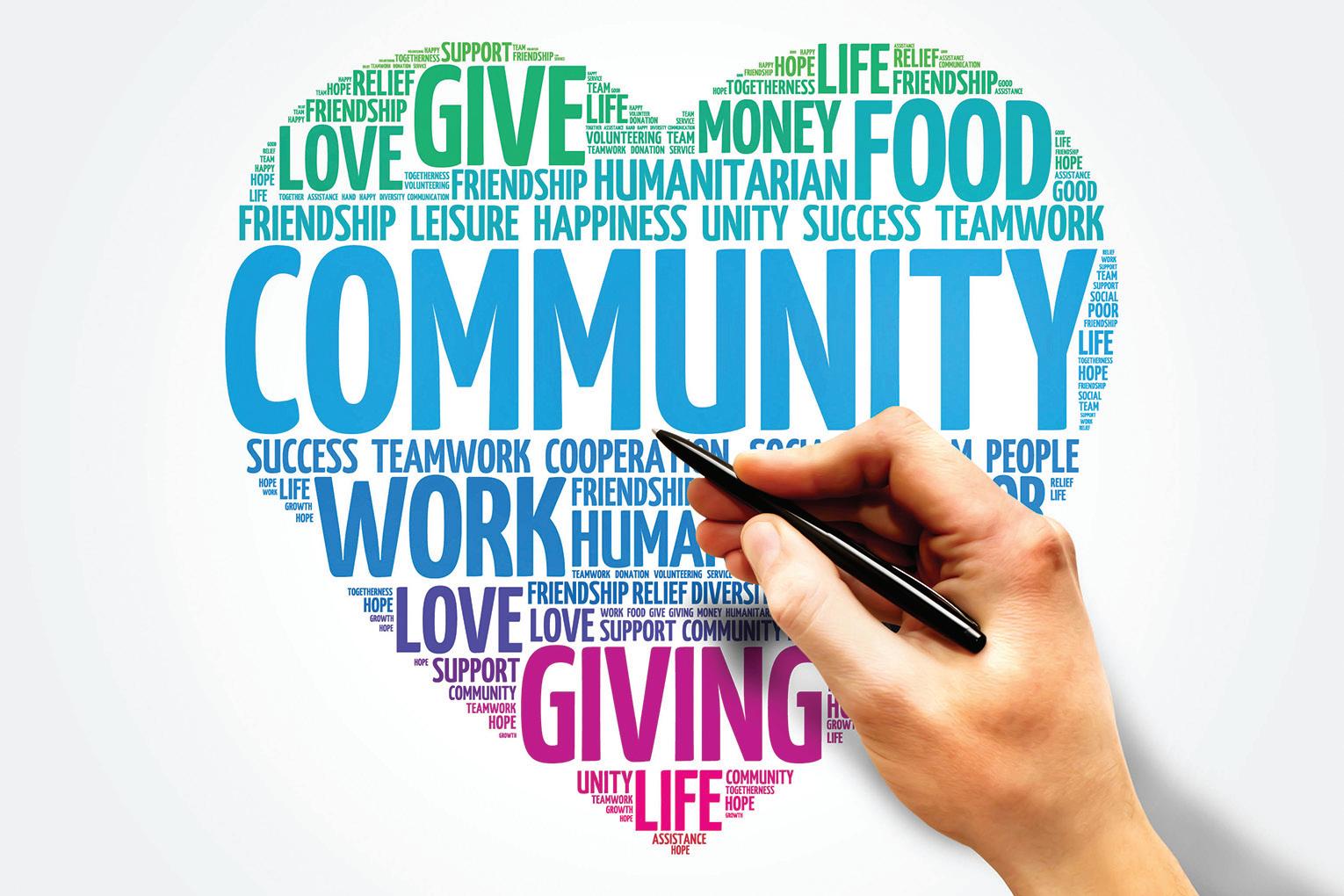
Columbia County
NONPROFIT GIVING GUIDE 2022

This special presentation features a sampling of our community’s nonprofits and their commitment to their clients and our community.
The nonprofits illustrate spirit, heart and passion and each offer strength to the community.
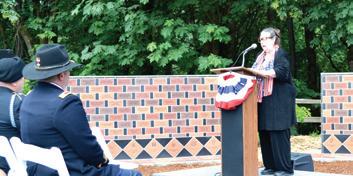
The Chronicle and The
Chief are proud to partner with the nonprofits as they enhance and strengthen the livability of our com munity through inspiration, engagement, leadership and economic growth. Our goal is to raise awareness of our com munity nonprofits, help
ing them to success fully navigate through their challenges and to attract more volunteers, monetary donations, and increase memberships and partner ships.

We encourage you to support these community nonprofits.

St. Helens Day Breakers Kiwanis “Serving the Children of the World”

The Day Breakers held the Children’s Fair on October 29, 2022 and plan to hold the Safety and Bike Fair in May, 2023. We work with local students to improve grades (elementary) and to help teens stay in school. The ever-popular Shred Day will be held on June 10, 2023


Meetings: Second Tuesday on Zoom 7 am, and Fourth Tuesday at 7 a.m. at the Kozy Corner. To visit a meeting, contact: Steve Howell Co-President -c/o PO Box 314 St. Helens for information.
St. Helens Garden Club


Serving the Community since 1927
Meetings are the second Thursday monthly at Noon. Meeting currently at Knapp Center of Caples House
Contact Thomas Berquam, for information on becoming involved. Send a request to us at PO Box 933 St. Helens, 97051-0933
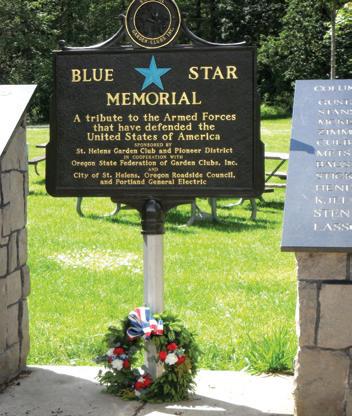
Our nonprofits provide value, livability, and quality of life
PAUL VOGEL Guest ColumnThe term “nonprofit” gen erally signals one of a couple things to most people: those who do for others, those who do something I can’t do and maybe don’t even under stand, or those who promote things and ensure availabil ity of things I may or may not have an interest in. But nonprofits often are viewed as “not businesses” – which is a misconception. And non profits often are not viewed as reflecting “business” or economic importance. That is a misconception, too. Many or most nonprofits operate as tightly and efficiently as any business, often with an even higher degree of accountabil ity to investors
And in fact, the nature or core purpose of the most vis ible, prominent and also the most prolific nonprofits say a lot about a community to forprofit businesses considering relocation to our community.

For example, if there is a preponderance of social services and support non profits, that can be a strong indicator about the overall health of the people in a place, and potentially the extent of those issues. At the same time, it can be a good indicator to businesses that a community takes care of its own, and social infrastructure is strong. That’s important for employee recruitment and retention.
If there’s a strong pres ence of singular interest nonprofits, that can indicate directed interest for youth sports, the arts, culture, reading and literature, the environment and outdoors --- the possibilities are almost endless. This, too, provides good indication of com munity priorities, values, livability, and quality of life – additional important factors in making decisions to relo cate a business, or expand.
What we hope for as a society, is effective and ef
ficient nonprofits that support people, specific populations, and communities – within our larger community.
From a business perspec tive, if our nonprofits are predominantly dealing with problems like drug abuse, child and domestic abuse, poverty and, essentially, problems and gaps – then that speaks of our community in one way.
But if these nonprofits are addressing those core societal issues that every region in the country is experiencing -- and uplifting our local populations, that’s a plus.
If we’re uplifting popu lations consistent with a national consciousness, that increases the breadth of sup port and, likely, national or state funding – in addition to our local support, to help them do their work.
A very important indi cator regarding nonprofits is how our communities –especially businesses that derive their income from the community – recognize, support, and engage with nonprofits providing services, and directed action right here where we live.
That’s particularly true when the engagement goes beyond financial donations and integrates with doing business, employing workers, and supporting the families that live here.
In Columbia County, we are fortunate to have a strong array of organizations specifically attuned to spe cific needs, from the Amani Center to the Columbia City Library – accessible to anyone no matter where they live in Columbia County. The Food Bank, too, is “univer sal” as well, set up to partner equitably with organizations and volunteers in each of our six cities and their surround ing populations. And these are just a few examples from many.
And we have Lifem powered, comprehensively supporting developmentally disabled people and also
partnering with Community Access Services -- which helps them find employment – and good employers. Gen erally speaking, employers who can and will work with these programs are employ ers that tend to avoid the loyalty and reliability issues of the current “quiet quitting” age. That’s good business.
The point is, if business support and engagement is robust, it helps our nonprofits do their job helping people, and helping people – our neighbors – makes for a stronger community; a com munity that’s good to live in, and a community that prospers. From churches to land trusts to rehabilitation, we have dozens of nonprofits in Columbia County that deserve your individual or business support. In recent years, nonprofits have found “Giving Tuesday” – the first Tuesday after Thanksgiving, as a national day for wide spread or focused giving. For 2022, that day has passed, but the opportunity has not. Investing in nonprofits before year-end can provide the double benefit of supporting local organizations doing good work, and a welcome tax deduction for yourself or your business.
Before January 1, decide what you care about. Decide what’s important for you, for your business, and maybe your employees. Decide what’s important for your community that you care to support. Then pick the right nonprofit organization – or two, or three – and support them meaningfully. Mean ingfully for the impact your engagement will have on the organization. Meaningfully for who the organization will help. Meaningfully for how it helps your bottom line. And yes, meaningfully for how it makes you feel.
Paul Vogel is the ex ecutive director of Columbia Economic Team. He may be reached at 503-805-5139.
Seeking thoughtful solutions to our communities toughest problems
CLAIRE CATT Guest Column
the change they’ve made in the world through their advocacy for education for girls, and for climate change. That’s United Way’s sweet spot.
It’s been a tough few years.
Too many people are struggling - paying the week ly grocery store bill, mak ing up for the learning lost during pandemic school, and recovering from disasters.
Columbia County has been fractured by partisan politics and pandemic fu eled isolation. But we know individuals can change the world. They don’t need to be powerful CEOs or elected officials. They don’t even need to be adults! Just think about Malala Yousafzai and Greta Thunberg, and
Our superpower is bring ing people together to make positive, lasting change. For example, United Way of Columbia County this year stepped up to serve nearly 1 in 5 Columbia County resi dents access healthy food, engage in learning, or take steps toward financial selfsufficiency.
our community. United Way of Columbia County makes it easy for you to take mean ingful action that makes a difference.

With our partners, experts, community leaders and residents, United Way looks at the toughest problems,
That can be volunteering for a program that helps strug gling kids shift the odds, like the Senior Volunteer ProgramBook Nook. Or speaking up for more support for single parents who struggle to make ends meet, despite being em ployed full-time. Or investing in solutions that are showing results, such as the summer
food, educational supports, and affordable health care in the summer months. And we are seeing positive results. Here in Columbia County, over the last year, United Way and the donors, volunteers and advocates who’ve joined us have made a difference. Consider:


• 1,350 Columbia County children received high-qual ity, age-appropriate, monthly books, through Dolly Parton’s Imagination Library Program.
logged more than 3,700 volunteer hours at local social service sites including local schools, food pantries, the Co lumbia County Courthouse, and senior centers in 2022.



• 32 households obtained or maintained permanent, safe shelter, through Emergency Food and Shelter Program funding.
Positive change is hap pening. But it doesn’t “just happen.” Change is cre ated together. And we’re in it
uitable community that offers opportunities for everyone to thrive. We can make it happen, together. People like you are the ones who make change happen.
Start today. Join us. Do nate at www.unitedwayofco lumbiacounty.com.
Claire Catt is the Execu tive Director of United Way of Columbia County. She may be reached at 503-556-3614 or visit www.unitedwayofcolum biacounty.com.
What does it mean to live inspired, fully empowered? For the people with intellectual/developmental disabilities that we support in Columbia County, this can mean a lot of things. It can mean learning the skills to live on their own. It can mean getting that dream job. It can be inviting friends over for a meal. The possibilities are endless and are all centered on the individual and their wishes and dreams.
“I have my job at McDonald’s. I get to live on my own. My staff helps me with laundry and groceries.” ~ Bobby

“I get to spend time with my friends. I get to volunteer at the Senior Center. I’m moving today into my own apartment. I’m excited for this whole new adventure.” ~ Crystal

“My staff was there and helped me through a hard time. I’m proud of my own apartment.” ~ Angel
None of this can be done without our Direct Support Professionals (DSP). These dedicated, committed, caring individuals are there to mentor, teach, support, and be there for the people we support and ensure they are living the life they choose.
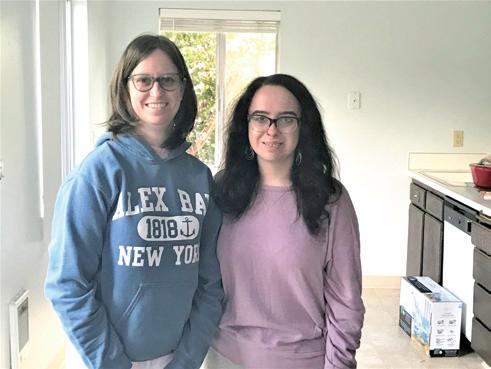

“The most fulfilling part of my job is days like today, seeing people move out of 24/7 care into their own apartment. It’s seeing people make decisions for themselves, to live the life they choose. Honoring choices.” ~ Erica Smith, DSP
We are excited to be moving forward with our capital campaign to build an Empowerment Center to better serve the people we support and the people in our community. The new center will replace our existing building which is more than 40 years old and is not in sync with the mission and vision of our organization. The completely accessible building will allow us to provide space for skill building and support, event/social space, as well as housing our administrative offices.
The Empowerment Center project will bring much needed support and community involvement to some of our county’s most vulnerable citizens. As caring members of our community, there are many ways you can become involved and support the people for whom we provide services. For more information on how you might help, visit our website www.lifemp.org.
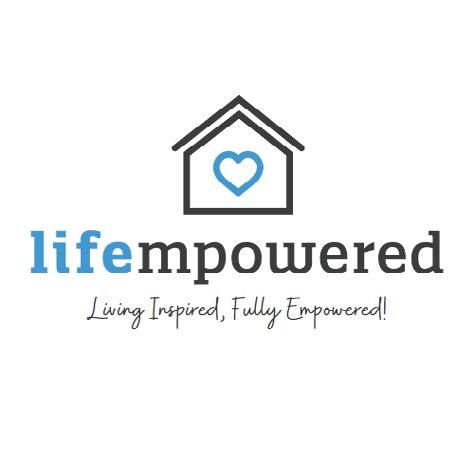

WE ARE HIRING!!!
• Direct Support Professional (DSP) - You will get to work directly with the people we support to meet their life goals, learn new skills, and have fun in the process!!!

• Operations Manager - You will be the guide and support for our DSP’s. Are you a leader? Great communicator? Great teacher/mentor? This might be the job for you!
For more information and to fill out an online application, visit our website at www.lifemp.org/career-opportunities

Nonprofit organizations in Columbia County

Amani Center (Columbia County Child Abuse Assessment Center)
Address: 1621 Columbia Blvd., St. Helens, OR 97051 Website: www.amanicenter.org Phone number: 503-366-4005 Email: info@amanicenter.org
CASA for Children
Address:2514 Sykes Rd., St. Helens, OR 97051 Website: casahelpskids.org Phone number: 503-410-5043 Email: casa.office@casahelpskids.org
CCMH (Columbia Community Mental Health)
Mailing Address: PO Box 1234, St. Helens, OR 97051
Office Address: 58646 McNulty Way, St. Helens, Oregon 97051 Phone number: 503-397-5211 Website: CCMH1.com Email: contactccmh@ccmh1.com
Clatskanie Arts Commission
Address: 75 S. Nehalem, Clatskanie, OR 97016 Mailing: PO Box 1110, Clatskanie, OR 97016 Website: clatskaniearts.org Phone number: 503-728-3403 Email: clatskanieartscommission@gmail. com
Clatskanie Farmers Market
Address: Copes Park, 11 Lillich St., Clatskanie, OR 97016 Website: clatskaniefarmersmarket.com Phone number: 360-612-7027 Email: CFMmarketmanager@gmail. comager@gmail.com
Clatskanie Foundation
Address: 75 S. Nehalem, Clatskanie, OR 97016 Mailing: PO Box 243, Clatskanie, OR 97016 Website: clatskaniefoundation.com
Phone number: Deborah Hazen: 503-338-8268 and Elsa Wooley: 503-338-9770
Columbia Arts Guild Address: PO Box 546, Columbia City, OR 97018 Website: columbiaartsguild.com Phone Number: 503-396-0875 Email: colartsguild@gmail.com
Columbia Chorale of Oregon: River City Singers
Address: 34976 Roberts Ln., St. Helens, OR 97051 Website: www.facebook.com/RCSCCO Email: mallen@opusnet.com
Columbia City Community Library and Secondhand Prose Used Book Shop
Address: 2000 Second St., Columbia City, OR 97018 Website: freewebs.com/cccomlibrary
Phone number: 503-366-8020 Email: ccclibrary@live.com

Columbia County Cultural Coalition Address: PO Box 824, Saint Helens, OR 97051 Website: columbiacultural.org Phone number: 503-396-0875 Email: info@columbiacultural.org
Columbia County Habitat for Humanity Address: 164 Little St., PO Box 921, St. Helens, OR 97051 Website: habitatcolumbiacounty.org Phone number: 503-366-1400 Email: info@habitatcolumbiacounty.org
Columbia Health Services
Address: 2370 Gable Rd., PO Box 995, St. Helens, OR 97051 Website: www.columbia-health.org Phone number: 503-397-4651 Email: contact@columbia-health.org
Columbia Funeral Home & Cremation Center Columbia Memorial Gardens
Every Life Celebrated
Family Owned and Operated. Serving Columbia County since the early 1900s.
Funerals, Cremations, Memorial Services, Grave markers, Pre-Arrangement Plans, Cemetery/Mausoleum Space 681 Columbia Boulevard St. Helens 503.397.1154 • www.columbiafh.com

Sponsor a child to receive 12 books this year for only $25.00 Donate at unitedwayofcolumbiacounty.com or by texting “DOLLYP” to 41444 United Way of Columbia County is the local Imagination Library affiliate

Nonprofit organizations in Columbia County
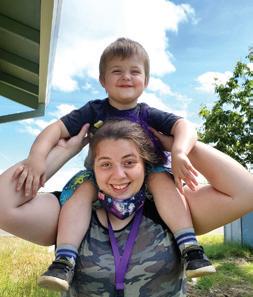


Columbia Pacific Food Bank
Address: 474 Milton Way, St. Helens OR 97051 Mailing: PO Box 1031, St. Helens, OR 97051 Website: cpfoodbank.org Phone number: 503-397-9708 Email: cpfb@cpfoodbank.org
Community Action Team
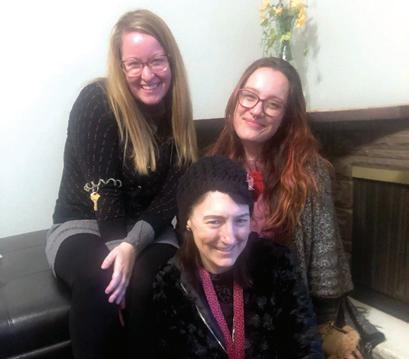
Address: 125 N 17th St, St. Helens, OR 97051 Website: cat-team.org Phone number: 503-397-3511 Email: housing_solutions@cat-team.org
CONNECT St. Helens
Address: 59902 Tamarack Dr., St. Helens, OR 97051 Mailing: PO Box 711, St. Helens, OR 97018 Website: www.connectsh.org Phone number: 360-244-3631 Email: connect@connectsh.org
HOPE of Rainier Food Pantry
Address: 404 E. A Street, Mailing: PO Box 448, Rainier, OR 97048 Website: hopeofrainier.com Phone Number: 503-556-0701 Email: hope97048@gmail.com
Keep it Local Columbia County Address: PO Box 1653, St. Helens, OR 97051 Website: keepitlocalcc.com Email: keepitlocalcc@gmail.com
lifempowered
Address: 105 Port Ave., St. Helens, OR 97051 Website: www.lifemp.org Phone number: 503-397-1922 Email: cindys@lifemp.org
Monday Night Live Alanon
Family Group
Address: PO Box 69, St. Helens, OR 97051 Website: oregonal-anon.org Phone number: 503-369-1195
NAMI Oregon (National Alliance on Mental Illness)
Address: 4701 SE 24th Ave. Ste. E, Portland, OR 97202 Website: www.namior.org Phone number: 503-230-8009 Email: namioregon@namior.org
OSSDAR Caples House Museum Complex
Address: 1925 1st St., Columbia City, OR 97018 Website: www.capleshouse.com Phone number: 503-397-5390 Email: capleshouse@comcast.net
Rainier Oregon Historical Museum (ROHM)
Address: 106 W. B St., Rainier, OR 97048, Mailing PO Box 762, Rainier, OR 97048 Phone number: 360-751-7039 Website: Rainiermuseum.org Email: rainiermuseum@hotmail.com
Rainier Senior Citizens, Inc.
Address: 48 W. 7th Street Rainier, OR 97048 Website: rainierseniors.com Phone number: 503-556-3889 Email: rainierseniorc@gmail.com
Rotary Club of Columbia County
Address: PO Box 721, St. Helens, OR 97051 Website: Rotary.org Phone number: 503-369-1375 Email: amy.grubb@waunafcu.org
SAFE of Columbia County
Address: PO Box 22, St. Helens 97051 Website: www.safeofcolumbiacounty.org Phone number: 503-397-6161

Scappoose Community Club
Address: PO Box 933, Scappoose, OR 97056 Website: scappoosecommunityclub.org Phone number: 503-320-7125 Email: administrator@scappoose community.org
ReStore hours: 9 to 5, Tues, Wed, Fri and Sat. Donations accepted Wed. and Sat. 164 Little Street, St. Helens www.facebook.com/sthelensrestore www.facebook.com/HabitatForHumanityOfColumbiaCountyOregon habitatcolumbiacounty.org
Thank you for helping us build a better future!
Nonprofit organizations in Columbia County
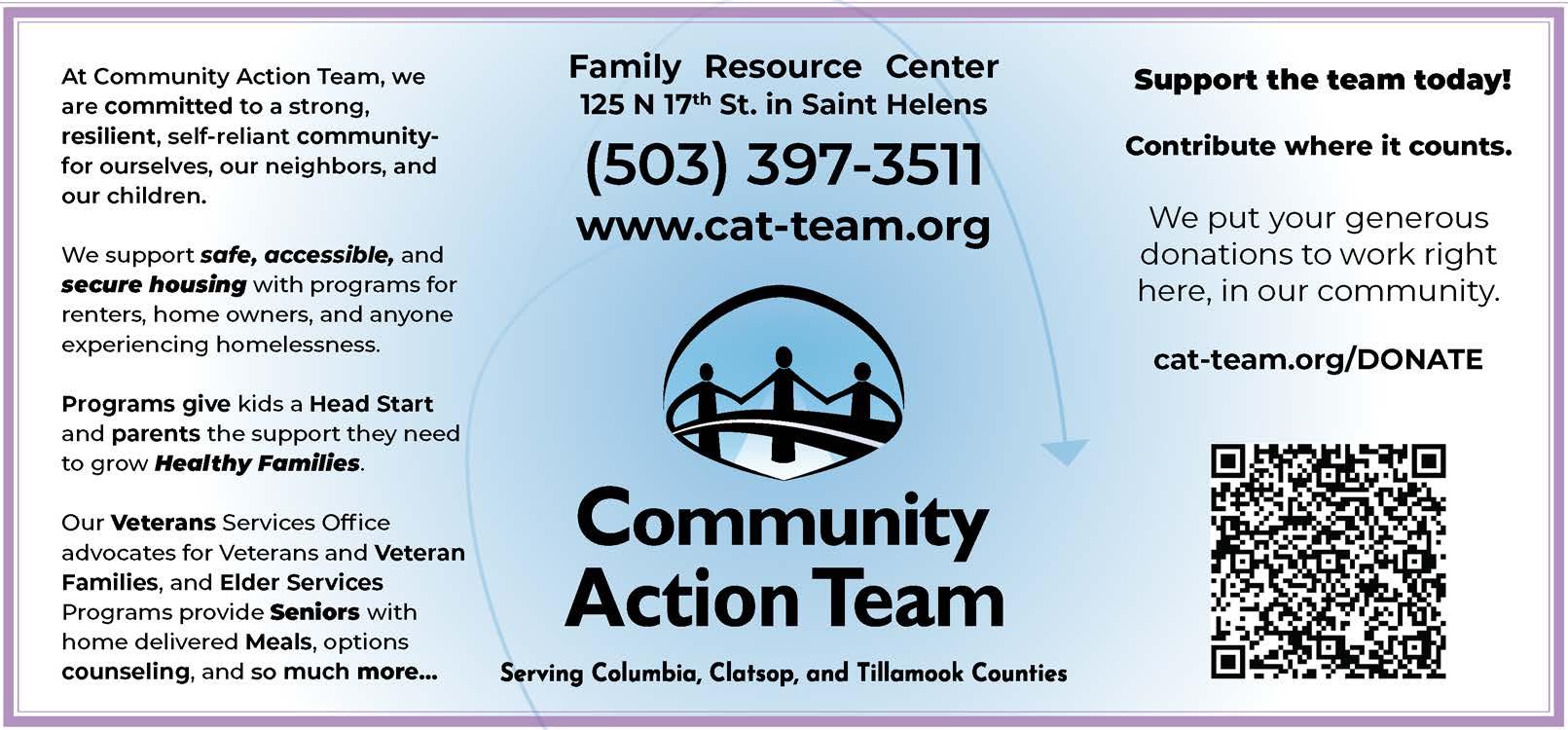
Scappoose Community and Senior Center
Address: 33342 Southwest Meadow Drive Scappoose, OR 97056 Website: scappoosecommunitycenter.org Phone number: 503-543-2047
Scappoose Historical Society
Address: 52432 SE 1st St., Scappoose, OR 97056 Website: Scappoosehistoricalsociety.com Phone Number: 503-396-9027 Email: Scappoosehistoricalsociety@gmail. com
Scappoose Volunteer Firefighter’s Association
Address: 52751 Columbia River Hwy., Scappoose, OR 97056 Website: www.srfd.us Phone number: 503-543-5026 Email: mheath@srfd.us
ShoeString Community Players
Address: PO Box 481, St. Helens, OR 97051 Website: http://www.sscptheater.org/ Phone number: 503-366-4406 Email: info@sscptheater.org
St. Helens Daybreakers Kiwanis Address: PO Box 314, St. Helens, OR 97051 Website: kiwanisdaybreakers.com/ Page/14268
Phone number: Steve Howell, President, 503-369-0588 Email: howellsteven49@yahoo.com
St. Helens Kiwanis Club Address: P.O. Box 295, St. Helens, OR 97051 Website: sthelens-or.kiwanisone.org Email: sthelenskiwanis@gmail.com
St. Helens Lions Club
Address: P.O. Box 1359, St. Helens, OR. 97051 Website: www.e-clubhouse.org/sites/ sthelens/index.php Email: sthelensoregonlions@gmail.com
St. Helens Senior Center
Address: 375 S. 15th St., PO Box 692, St. Helens, OR 97051 Website: shseniorcenter.org Phone number: 503-397-3377 Email: manager@shseniorcenter.org
The Bread Place 33548 Havlik Dr, Scappoose, OR 97056
The Flippin Castle
Address: 620 SW Tichenor Street, PO Box 383, Saint Helens, OR 97051 Website: clatskaniecastle.com Phone number: 503-338-8268 Email: dshazen13@gmail.com
Top Notch Thrift Store
Supporting the St. Helens Senior Center
Address: 1844 Columbia Blvd., St. Helens, OR 97051 Website: tnthriftstore.com Phone number: 503-397-5386 Email: manager@tnthriftstore.com
Turning Point Community Services Center
Address: 220 E. Columbia River Hwy., Clatskanie, OR 97016 Mailing: PO Box 773, Clatskanie, OR 97016 Website: www.clatskanieturningpoint.org Phone number: 503-728-3126 Email: turning3point@gmail.com
United Way of Columbia County
Address: PO Box 538, Rainier, OR Website: www.unitedwayofcolumbiacounty. com Phone number: 971-225-0402 Email: info@unitedwayofcolumbiacounty. com
Why
ELLYN BELL Guest Columnimportant to remembering non-profits this holiday season
These final days of the year are dark in more than a few ways for those struggling in our communities. In Columbia
County, we have almost 20,000 households, out of a population of 51,000 people, who earn more than the Federal Poverty Level but less than the cost of living for the county. 12% of the population lives below the poverty level.
The small and large nonprofits of our county work diligently every day of the year to ensure that those who have suffered abuse, homelessness, intimate partner violence, and hunger are not left without hope.
We deeply appreciate every gift our community gives this season, as well as throughout the year. The small and large kindnesses shown to your nonprofit of choice make a big difference in the lives of the people we serve.
Some say that changing the world is impossible. But when you provide hope for another person, you provide hope for yourself, and consequently, for all whom you love. Hope is a magic potion that never runs dry.
Thank you for your gifts to nonprofits this holiday season. Thank you for providing hope. In gratitude.
Ellyn Bell is the Executive Director of SAFE of Colum bia County.
SAFE offers choices to domestic violence victims
STAFF REPORT Country Media, Inc.Each year, Columbia County partners with local nonprofit victim advocacy groups to heighten awareness about domestic violence.
“Domestic violence is a pervasive, often life-threaten ing crime affecting millions of individuals across our nation,” according to a proclama tion issued by the Columbia County Board of Commission
ers. “Nationally, an average of three women are killed daily by a former or current intimate partner. In addition, children exposed to violence are more likely to attempt suicide, abuse drugs and alcohol, run away from home, become victims of human trafficking, and commit sexual assault crimes.”
In Columbia County and elsewhere in the United States, organizations are getting the word out about violence prevention and protection of
victims.
SAFE (Support Advocacy Freedom Empowerment) is collaborating with community partners and others to increase awareness of domestic vio lence in the community.
SAFE Office Manager Susan Barrientos-Byrd said domestic violence is not limited to beatings. SAFE often deals with emotional and financial harassment, she said. Barrientos-Byrd said women often struggle with leaving and
return to their abusers.
“We offer them support, encourage healthier relation ships, and help our clients move forward,” she said.
Domestic violence records from the Columbia County Sheriff’s Office or the St. Hel ens Police Department were not immediately available. The records are kept year by year.
SAFE Executive Director Ellyn Bell said anybody, male or female, at any age, can be a victim of domestic violence.
Intimate partners, she added, are more likely than others to commit violence, and they include adults living with parents.
“Anybody could be vio lent,” she said. “It’s a choice.”
There is a SAFE house in Columbia County to shelter abuse victims. Bell said it is at an undisclosed location to protect the victims of abuse.
SAFE also shelters victims in hotels. Besides provide housing a victim for a short
stay, shelter officials also could obtain a restraining order to best protect the victim. There is a restraining order office at the South Columbia County Chamber of Commerce, she noted.
SAFE offers a 24-hour bi lingual (English and Spanish) hotline at 503-397-6161.
Nearly every county in Or egon has at least one domestic violence program, and there is a national hotline that “sends people back to us,” Bell said.
For
The St. Helens Lions Club

“We Serve” in many ways
CCMH creates safe and supportive opportunities for healing and recovery, enhancing the overall quality of life for members of Columbia County.

Main Campus: 58646 McNulty Way St. Helens, OR 97051

Walk-In Clinic Schedule Mon and Tues, 1pm-3pm Thurs and Fri, 9-11am
*call if these days/times don’t work for you
Youth and Family Building: 58646 McNulty Way, St. Helens
* call if these days/times don’t work for you.
Walk-In Clinic Schedule Mon 9am-11am, Thurs 3pm-5pm
7 Steps to free yourself from emotional abuse
ELLYN BELL Guest Column
You saddle up next to your honey in the car. You’re off to a much-needed romantic night out dancing. You look fabulous. You feel excited and ready to get moving on the floor. You smile at the possibil ity of a good evening.
On the ride to the club, your partner chides you on your appearance, just a little, but enough to make you wonder if you really do look so fabulous. You’re used to this, though, so you let a small thing go. You really want to have a good time tonight.
At the club, you’re both enjoying yourselves. Laugh ing, having a couple of drinks, enjoying the music, and then—everything changes. Your partner stomps off the dance floor angrily and gives you the silent treatment. Your heart sinks. You try to ap pease them and apologize for whatever you might’ve done wrong. You try to figure out what is going on. You cajole and encourage without luck. You’re blindsided again.
Your partner walks out. You follow, still trying to fix the situation. On the ride home, they accuse you of flirt ing with someone on the dance floor. You deny it. It isn’t true. Then the insults come, one after another and completely unrelated to the evening.
You feel devastated. You feel defeated. You’re exhaust ed, but you can’t sleep.
The next day, your partner brings you coffee in bed and says, “good morning, sweet heart,” as though nothing had happened the night before. You breathe a sigh of relief, but a shiver runs down your spine.
1. Understand the problem
You are experiencing emotional abuse, which is a non-physical form of power and control. Emotional abuse occurs when a significant other, parent, or other close person uses your thoughts and feelings against you. Belittling, twisting words, contempt, and passive aggression are all forms of emotional abuse.

Not all emotional abuse is created equal, and that’s one reason why it is often denied, explained away or minimized. Don’t compare what is hap pening to you to someone else’s abuse. Don’t explain it away. Any abuse is unaccept able! No one deserves it. You do not deserve to be treated badly, regardless of anything you may or may not have done.
All forms of emotional abuse take a huge toll on the mental health of the victim. Playing mind games and using the good nature of a person to manipulate them is deeply insidious and destructive.
It’s sometimes difficult to acknowledge when you’re be ing emotionally abused. It hap pens slowly over a period of time and is always interspersed with the “good times” and positive behavior. You can’t

easily put your finger on it. Emotional abuse doesn’t leave visible scars, but its impact upon the mind, body and spirit are still immense.
If you think that you are experiencing emotional abuse, seek assistance from a domestic and sexual violence advocate or a counselor. Learn as much as you can about emotional abuse and arm your self with tools of knowledge.
2. Know thyself
The second step to overcoming the impact of emotional abuse in your life is to understand your history. Knowing your susceptibility to manipulation and control will help you gain awareness of yourself. Change is only pos sible with self-awareness.
What in your past has left you susceptible to emotional abuse? The stage for any type of abuse is most often set in childhood. Childhood factors include:
• Bullying; name-calling and being the subject of jokes by peers or adults
• Narcissistic or addicted parents
• Abuse of any type in the home
• Sexual abuse or exploita tion in or outside of the home

Children who learn that it is necessary to be responsive to the needs of others in order to be loved are ripe to become targets of abuse. Children who are scapegoated or victims of
covert abuse by caregivers, teachers or peers struggle emo tionally and doubt the validity of their feelings.
A note to the wise: Know ing your past and susceptibility is not about blaming others in your past. Knowing yourself is like reading a book and gaining information. You need the information in order to create a different outcome. Look at the facts objectively. Feel the feels, but don’t waste time with blame or shame. Keep moving forward with a clearer understanding of where you came from and where you want to go.
Celebrate that you’re still here. Celebrate your resilience.
3. Examine your agenda with power
At the root of all abuse is a need for power and control. Years of research on domes tic and sexual violence have taught us that abuse is a pattern of coercive control used by one person against another. The Duluth Abuse Intervention Project’s Power and Control Wheel first demonstrated this fact almost 40 years ago.

The wheel shows differ ent strategies used by abusers to gain control over potential victims. Emotional abuse is one spoke of the wheel.
Look at the ways power and control have affected your life. Additionally, look at the ways in which you may have used power and control against others. As humans, we often use control tactics as a means
of trying to protect ourselves or others.
It’s always tempting to focus on the abuse and the abuser, but we can’t fix anyone but ourselves. Overcoming abuse is about focusing on you and your response.
Knowing your agenda with power is an important step in overcoming the abuse you may inflict upon yourself, as well as the abuse inflicted upon you by another.
4. Observe the emotional games
When you become the ob server, rather than the reactive person in a situation, you allow yourself to gain more insight.
Emotional games are exhausting! Pull yourself out of the game and watch it unfold as you would a movie. Observe, but don’t engage in the scenario. Like an actor in improvisational theater, you decide what your next input will be based on what is going on around you. This strategy allows you to see choices of response that you miss when your mind is in a reactive state.
Gaslighting is a technique often used by abusers to con trol and frighten their victims. Gaslighting is a mind game that twists your emotional response into a pretzel, if you fall prey to it. It can only be overcome when it is observed and understood. The term comes from a 1944 movie, of the same name. Gaslight, the movie, captures the essence of emotional abuse perfectly.
Abuse is cyclical and inconsistent. Relationships are never all good or all bad. The reasons people stay in harmful relationships are due to this cyclical quality. It’s easy to question your version of real ity. “Did this really happen or is it my imagination?”
Chronic disrespect and cruelty start out slowly. If you throw a frog into a pot of boiling water, it will jump out immediately. If you put a frog into a pot of water and turn the temperature up slowly until it boils, you will kill the frog.
Recognize the tempera ture of the water around you. Give yourself permission to acknowledge what you see and feel. Trust yourself.
When you take the heat out of the moment and watch it unfold, you will gain insights into how the game works. From that vantage point, you can make new decisions.
For safety reasons, it’s important not to announce what you are doing to the abuser. Become the observer quietly. Become an actor in the improvisation, putting all reactivity aside.
Taking charge of your reac tions is a potent way to gain a sense of power over the situa tion. Once you fully compre hend that you can change your relationship by changing your response, you will gain your first foothold into removing yourself from people that dis respect and disempower you.
Pure. Professional.
5. Engage your inner sleuth

Knowing how the abuse has affected you will help you focus on your own heal ing. It might not be readily apparent at first, so it’s neces sary to pay attention to the clues. Like an old-fashioned detective with a magnifying glass in hand, learn about the ways that emotional abuse has impacted your wellbeing.
• Are you taking respon sibility for the behavior of others?
• Do you find yourself numbing out with alcohol or drugs?
• Do you have issues with attachment—are you needy or avoidant?
• Are you challenged by decision-making tasks?
• Do you find yourself walking on eggshells, always paying more attention to the needs of others over your needs?
• Do you say yes when you want to say no?
• Are you struggling with anxiety and/or depression?
• Do you find yourself engaging in critical self-talk?
These are just a few of the clues that you might explore in your in-depth inquiry. The goal is not to blame or focus outward, but to focus inward at what you can control and what you can do to improve your wellbeing.
Knowing how you are impacted by abusive behav ior you can choose to get
assistance to help you make changes in your life.
6. Practice empathy toward yourself
Face your fear with a little kindness. Honestly, this will go a long way. Overcoming bondage to emotional abuse and mov ing on with your life begins with learning to be kind to you. All of these strategies at some point converge on the necessity to be patient and kind with yourself as you practice them.
If you’re in a marriage or a long-term abusive relation ship, you are working to overcome years of patterned responses. You can do this. Treat yourself as a friend or family member you’re help ing. Show yourself the same love and care as you would a stranger you agreed to help. Go out of your way to find answers as you would for another.
Honoring yourself reaffirms your dignity and right to live free from abuse. Before you know it, you’ll wonder why you ever stayed in a relationship that didn’t treat you with the respect you deserve. Allow yourself to become authentically and wholly you, imperfect, but without apologies.
7.
cal safety. Decide how you will make changes. If at any point you choose to leave, do it deliberately.
Envision the path ahead of you. Know who you are and who you want to be come. Embody and celebrate your good character traits. Work on mending your bro ken places. Get clear about your strengths and intentions. It isn’t necessary to know five steps ahead, just plan the first step and take it.
This path is unique to you and your journey. Acknowledge what you’re going through, journal, note your progress and victories. You might try some positive reframing of old nega tive thinking. Reframe the thought, “I’ll never get better. He/she is not going to let me change,” with “I’m working on changing my responses. I’m not responsible for other people’s behavior.”
Messing up, making mis takes, and forgetting are all part of the healing process. Healing is a spiral journey to be embraced.
Plan ahead, but let your path unfold as you move forward. Notice all of the diligence you’ve exhibited. Notice the resilience that you have built. Pretty quickly, you’ll be well on your way. Keep moving forward and don’t look back.
HOPE moving forward in Rainier
LAUREY WHITE Guest ColumnVolunteers are a key ele ment of local social services in Clatskanie and Rainier.
The volunteers at HOPE of Rainier were recognized at a public open house, Oct. 1.
HOPE of Rainier, or Helping Our People Eat, is a food pantry that has been an institution in Rainier since 1988, helping those who face food insecurity.

The goal of the nonprofit agency is simple: to make sure no resident suffers from hunger.
Mission not impossible
HOPE Board President Lisa Soule said the mission has been made much more convenient due to the food pantry’s recent upgrades, an industrial sized walk-in refrigerator and freezer. The new equipment was formally introduced during HOPE’s open house at the food pantry located at 404 E 8th Street in Rainier.
dously.”
Before the new appli ances, the food was stored in an array of refrigerators and freezers.
HOPE Executive Direc tor Kelly Miller worked to access funds for the new equipment. The 100 + Women Who Care Lower Columbia chapter provided approximately $8,000, while the remaining funds were acquired through various grants and proceeds from the Picnic in the Park, held in August 2021.
“We have many wonder ful volunteers,” Soule said. “They are the backbone of our organization, and we could not do it without them.”
“I saw an ad in the paper and started volunteering nine years ago and have loved it ever since,” area resident Shirley Pryor said.
HOPE’s Partnerships
Forge a new path
Where do you want to go from here? Do you want to stay in the relationship or do you want to leave? Whatever your choice, choose con sciously. If you’re planning on staying, have a safety plan for both emotional and physi
By the way, you’re look ing fabulous.
SAFE of Columbia Coun ty offers a 24-hour crisis line, advocacy and shelter to those seeking an assistance. Call 503-397-6161. Ellyn Bell is the Executive Director of SAFE of Columbia County.

Soule said the kitchen equipment has been needed for quite some time to meet the community’s growing need.
“We help anywhere from 90 to 120 families a month,” she said. “There is a growing need for afford able meals. The new equip ment has helped tremen
Miller said that the population in Rainier is growing with a food insecu rity rate of 11.4%, which is why the new equipment was sorely needed.
The equipment was ordered and delivered all in a relatively short period of time in July and August. Volunteers helped install the equipment.
HOPE of Rainier is affili ated with the Columbia Pa cific Food Bank and operates on donations, fundraisers, grants and resale income, such as the HOPE Chest Neighborhood Thrift Store, located at 107 East 1st St. in Rainier. Miller also oversees Turning Point Community Services Center, the non profit social service outlet at 220 E Columbia River Highway in Clatskanie. Most of the food re ceived for the food banks in Rainier and Clatskanie comes from the Oregon Food Bank network and generous donations from the public. All donations to HOPE of Rainier are taxdeductible.
To donate, or to vol unteer, contact HOPE of Rainier at 503-556-0701. Turning Point may be reached at 503-728-3126.
When you hear about the Amani Center, based in St. Helens, Oregon and serving children throughout Columbia County, the meaning may not have the impact that it really could. The origin of this safe place where children go to tell some of the most traumatic stories of their short, little lives, is lost in translation, so to speak. What does “amani” have to do with stories of abuse, chronicles of neglect or instances of violence, both witnessed and experienced?
Amani means “peace” (Swahili). Amani means “wishes”(Arabic) and Amani was the name of our first Executive Director. And for the Amani Center (Columbia County Child Abuse Assess ment Center), Amani means even more.

Before the Amani Center (Columbia County Child Abuse Assessment Center)
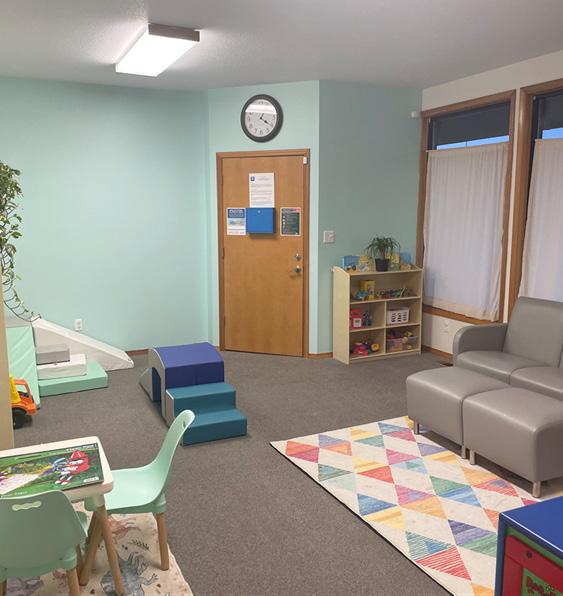
What’s in a name?
child victims of abuse or neglect in Columbia County (from Scappoose to Clats kanie to Vernonia) had to overcome obstacles to travel the distance to Portland and sit in emergency waiting rooms filled with additional trauma cases that “outweighed” their own, await ing interviews with multiple medical personal who often lacked the proper training to perform medical evaluations that were developmentally appropriate, trauma-informed and specific to child abuse. They would relive the details of their experiences, sharing them with first responding officers then detectives, then the District Attorney, then grand jury and sometimes again in court, to a judge, in front of the person who had hurt them, further exacerbat ing the effects of the Adverse Childhood Experiences that they had encountered, and inhibiting the opportunity for healing, recovery and peace.
In 2000, the Amani Center was established by local com munity members to address the need for local, responsive resources for children and families impacted by abuse and neglect. Since 2003, the Center has been providing fo rensic interviews and medical evaluations, as well as support resources and assistance in navigating the investigative process, for local children and their non-offending family
members and caregivers.
Amani Center staff conduct neutral forensic investigations in the form of interviews and head-to-toe medical exams with results provided to detec tives, child protective services and the District Attorney to determine a child’s safety, as well as next steps that need to occur in a case.
Amani Center services are provided free of charge to the child and their family, with expenses covered by medical
insurance reimbursement and Crime Victims Compensation, as well as competitive grant funds provided by federal and state government and founda tions; corporate donations; fundraising revenue; and contributions from individual donors in the community. The Amani Center depends heavily on the generosity of like-minded individuals, com panies and foundations who see the value in intervening on behalf of a child, shifting
their life of trauma and suffer ing toward a road of healing and recovery, ending the cycle of abuse and improving the overall outcomes of indi viduals and our community at large.
There is hope for children who have suffered from child maltreatment, the overarch ing term of abuse, neglect and violence. Children are very resilient, and given the chance, can thrive when sur rounded by safe, supportive environments. The interven tion that occurs through an Amani Center assessment provides resources and tools for children and families to begin the healing process and move towards a life of recovery. In short, the Amani Center is a starting point for “peace”.
If this organization sparks an interest in how you might support and serve local children experiencing abuse and neglect, you can contact the Amani Center directly to find out how to get involved.
Email Beth Pulito at bpu lito@amanicenter.org or call 503-318-0568. To learn more about the Amani Center, visit their website at www.amani center.org. Financial support is always welcome and neces sary to continue implementing the mission. Donations can be made online on their website or by sending a check to: Amani Center, PO Box 1001, St. Helens, OR 97051.
Follow the story of “Asher” this holiday season...
Although, “Asher” the child is a fictional character, the story is based on elements of stories from the thousands of children we have served over the years and is a confidential way for us to share with you how our center helps child victims in Columbia County.
In our lives,“Asher” the dog is an Amani Center Victim Advocate’s pup who comes to visit our staff throughout the week, lighting up our lives and lightening our hearts.
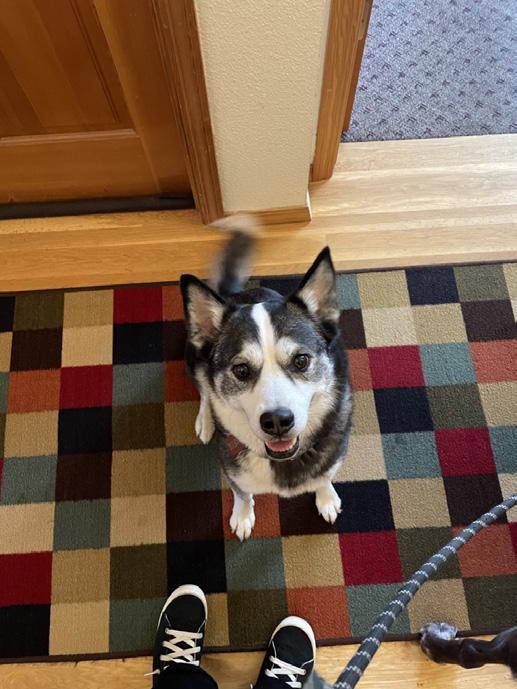
Donate Facebook News



